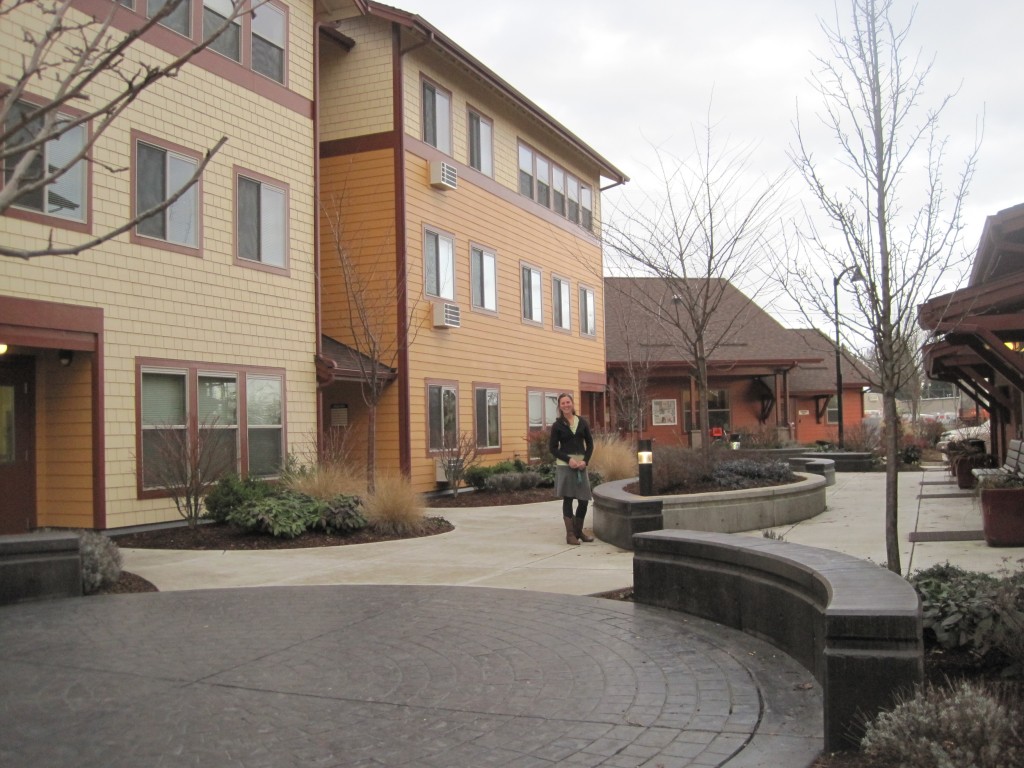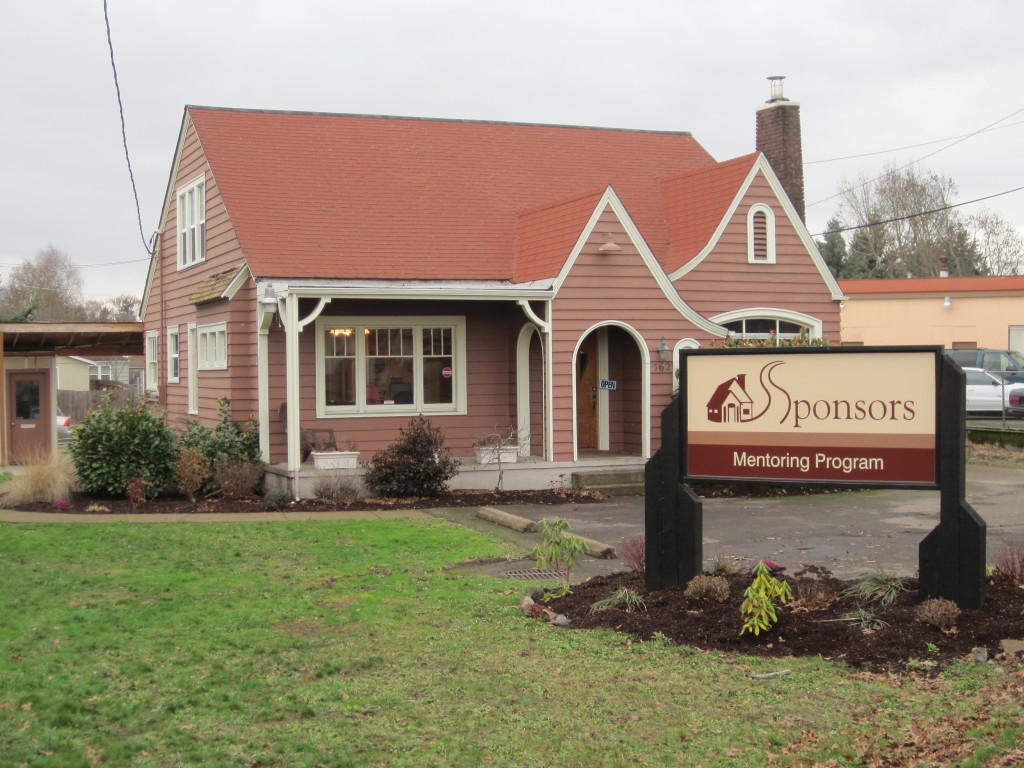Published in the March 2014 Boomer and Senior News, Lane County Edition. Photos by me.

Mentorship Program Director Jen Jackson walks through the courtyard of the men’s transitional housing at Sponsors’ west Eugene location. Photo by Vanessa Salvia
Mentoring Changes Lives
Older volunteers are in much demand at Sponsors.
By Vanessa Salvia
If you are the kind of person that enjoys visiting coffee shops for conversation, attending symphony concerts or going on hikes, then those kinds of activities probably seem like a normal part of life to you. But for the people that receive help through Sponsors, Inc., these activities seem anything but normal.
Sponsors is a Eugene-based program that helps adults recently released from prison transition into the community. Founded in 1973, Catholic nuns and community volunteers “sponsored” young men exiting the Oregon State Correctional Institution, assisting them in finding shelter, employment, and helping in social readjustment. Jen Jackson is the mentorship program director. She relies on a large number of volunteers to serve as mentors and work one-on-one with these adults. “In the prison system, they write up transition plans for the men and women saying, ‘Do not associate with others on parole,’ and ‘Must engage in pro-social activities,’” explains Jackson. “But when you’ve been living on the streets and causing crime it’s all you know and addicts are the only people you know, you don’t know how to go to the opera.” Any adult 21 and over can serve as a mentor, and she says that the boomer and senior volunteers she works with in the program are highly valuable. “We have a lot of retired individuals volunteering with us that are flexible and have a lot of life experience,” she says. “It does not matter at all if you’ve been to prison or not. Some of our best mentors have never even smoked a cigarette. It’s just about knowing how to be a good listener. It’s spending time with the person on a regular basis.”
Jackson seeks volunteers to commit to spending 6 hours a month, at a minimum, with their mentee. Mentors and their partners meet for regular conversation, going to movies, having coffee, board games, going hiking or going to the coast. “If you’ve been in recovery a long time or if you’ve never been in recovery, these are the things that seem like normal day-to-day things for you but these are really out of people’s comfort zones,” she says. “It’s a way of normalizing someone whose getting out of prison and replacing labels of ‘felon’ or ‘bad mom’ or ‘addict’ with ‘I’m a good chess player’ or ‘I’m a good bike rider.’”
Sponsors promotes group activities such as tickets to theater performances and drives to the mountains for snow shoeing. The one-on-one relationships between the ex-prisoners and the mentors help the ex-prisoner engage in confidence-building activities in a safe and comfortable manner. “We’ve had some pretty special boomer and senior matches who have stuck together for a long time, who have continued to be friends long after the supervision period ends,” says Jackson. “We supervise matches for one year. For one of our matches, Dave and Paul, it’s been almost two years since their match closed and now they still get together, they’re friends.”
Vince Puleo, 72, is a real estate agent and a retired forest service worker. Puleo is a member of several volunteer groups in town, such as the Elks and a group for veterans. He was looking for a volunteer opportunity when he discovered Sponsors. He and his partner, Marc, 51, who didn’t wish to give his last name, have been matched up since November 2013. Marc requested a mentor with some specific qualities: they had to be non-smoking and also had to like golf. He also requested a mentor that had no criminal past. “I figured that would help me see new horizons,” says Marc, “give me a new outlook.” Since then, Puleo and Marc have gone crabbing on the coast together, they saw the opera “La Traviata” together, and they have gone to Duck games. Puleo and Marc also visited the Cascades Raptor Center, which houses injured and rehabilitated birds of prey—“I’m a bird nut!” says Marc—and also went to a talk given by the North American Butterfly Association. Fishing is in the future for both of them. In the meantime, Puleo has met Marc’s sister and brother-in-law, who Marc says are his closest friends and family. It means a lot to him to have his mentor get to know his support network.
Greta and Carol are another match made through Sponsors. Greta’s daughter is in prison, and that’s what inspires her to volunteer as a mentor, says Jackson. Her mentee, Carol, knew Greta’s daughter in prison. Greta is raising her granddaughter and Carol is trying to gain custody of her grandson, so these two women have bonded over many aspects of their similar, yet different, lives.
Sponsors provides transitional and long-term housing for men and women and support services such as banking help. Men and women live at separate sites. “They are held really highly accountable to live here,” says Jackson. That involves multiple drug tests each week to make sure they remain clean and sober, and they must honor a curfew. The program is much in need, and currently has a wait list of over a year to begin to receive help. “The program works for those who are ready to change their life,” she says. At the men’s unit, 60 people can live in shared rooms, and when they graduate to the honors program they can move to one of 12 private units. Successful graduates leave Sponsors with a source of income, clean and sober and with a housing plan. Jackson says that 70 percent of Sponsors clients are deemed successful when they leave. Sponsors also only takes the highest-risk offenders. “There’s a risk assessment score to see how likely someone is to reoffend and we only take the most likely of those to reoffend, those that score high and very high,” she explains.
Jackson has been managing the mentoring program since its inception three and a half years ago. “It’s like Match.com!” she jokes. “We’ve got 20 new people we’re trying to figure out who should go with who as a partner and why.” As of January 2014, the Sponsors mentoring program has created 337 mentoring matches with 238 mentors since the program started. “We always need more,” she says. “We ran some recidivism data for Lane County and those who complete the mentorship program are 50 percent less likely to return to prison over a two-year study. There’s 14,000 people in prison in Oregon and 50 people per month that come back to Lane County from state prison and half come back homeless, so that adds up pretty quickly as far as people to serve.”
Marc spent time in and out of prison as an adult. He spent a year in federal prison before being released. “It changes you,” he says. “It hardens you.” Marc, who enjoys creative writing and would like to be a published author or journalist, is actively trying to change his life. In prison, he studied meditation through the Human Kindness Foundation, which is how he became aware of Sponsors. Marc had been living at the Eugene Mission for a year, and also had two previous mentors that he didn’t connect with. Jackson said Marc reached out to his parole officer who told him to give Sponsors another try. Now that he and Puleo have been matched up, it’s changed both of them.
“I didn’t put butterflies or raptors down on my list of interests,” Puleo jokes. And for Marc, “I doubt I would have previously gone into a roomfull of people to watch a talk about Costa Rican butterflies!” he says. “This experience with Vince has been nothing but good. I can see me and Vince still talking even after our year is up.” Marc would like to encourage others to come forward and give their time as volunteers. It’s important for him to make people aware that just because someone has a criminal past, that doesn’t mean they’re thinking about crime 24 hours a day. “Even though we’re ex-prisoners we have a lot of different interests and experiences,” Marc says.
According to Jackson, the average person who has gone through the Sponsors program has said that they have had only two positive people in their lives. “In their whole lives,” she asserts, “and they’re adults, so it’s pretty critical to have someone they can spend time with who has a head on their shoulders whose not going to judge them.”
Sponsors, Inc.
541-485-8341
www.sponsorsinc.org

No comments yet.